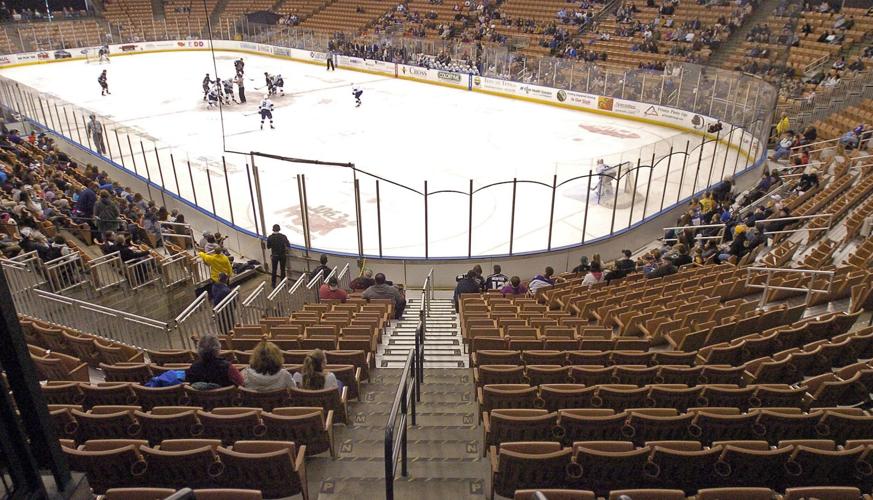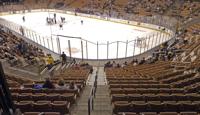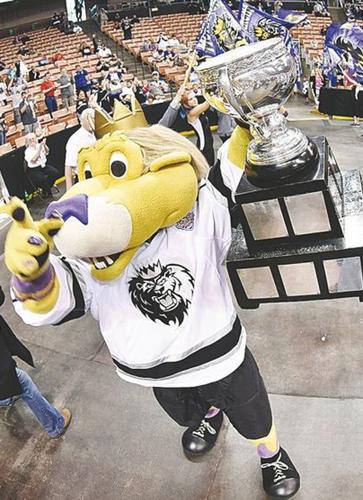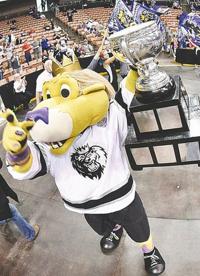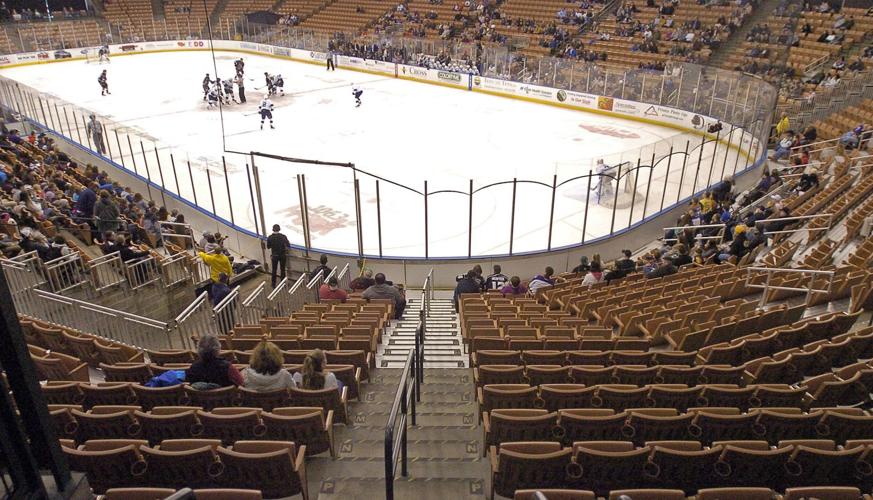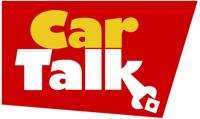MANCHESTER — The Manchester Monarchs — the professional hockey team that drew thousands of hockey fans to the Queen City and provided a linchpin in the downtown redevelopment of the early 2000s — is hanging up its skates, the team announced Wednesday.
The announcement means that the 2018-19 season was the last for the Monarchs and next winter will be the first in 18 years that professional hockey isn’t played at the city-owned arena, currently named the SNHU Arena.
The team had been for sale, and Monarch chief executive Brian Cheek said the owners spoke to several potential buyers. No offer was acceptable; he said operations have ceased and an orderly wind down has started.
Twenty-one jobs — 17 front-office staff and four hockey-related positions — will be lost.
“It’s just clear to us minor league hockey is not viable in Manchester at the ECHL level,” Cheek said.
The Monarchs started in Manchester as the American Hockey League affiliate of the Los Angeles Kings when the arena opened in 2001.
Both Monarchs and the arena prospered, sparking a downtown revival. In its third year, the team drew a league-best, average attendance of 9,141 fans per game, its best year.
But the Kings moved its AHL affiliate to southern California four years ago, and the Manchester Monarchs moved to the lower-level East Coast Hockey League in the 2015-16 season.
It has suffered dwindling attendance since the move. This past season, the Monarchs drew an average of 2,400 spectators per game
On Wednesday, downtown merchants said business attributed to the team was insignificant.
“When they switched divisions, it changed everything,” said Mike Patellis, manager of Murphy’s Taproom and Diner. The popular restaurant, nearly across Elm Street from the SNHU Arena, drew a few Monarchs fans for this past season’s games, but nothing significant, he said.
He said hockey will only be successful if a quality team is brought in.
The Monarchs bring in a few customers, but nothing compared to rock concerts and other SNHU Arena events, said Alicia Dunning, a waitress at the Kisaki Japanese restaurant.
In a statement, Mayor Joyce Craig noted the steady decline in attendance with the loss of the AHL franchise. But she said concerts and other entertainment sell out.
“The SNHU Arena is a key partner in making Manchester’s downtown a destination. I have full confidence the SNHU Arena will continue to be a valued partner in bringing additional entertainment options to residents and visitors,” Craig said.
The city owns the arena and uses state revenue-sharing dollars to pay for it. The city leases the arena to a private company, SMG, to operate it.
In a statement, the arena manager said SNHU Arena ranks among the top 10 of arenas its size, it has a strong calendar of events, and the departure of the Monarchs provides more opportunity for concerts, trade shows, family shows and other sporting events.
“We will begin to research a new professional team to call New Hampshire home,” said Tim Bechert, the general manager of SMG. Bechert said he only found out about the decision from the Monarchs’ website.
SMG said the Monarchs’ departure will not affect any revenue-sharing mechanism with the city. SMG said multiple years are left on its agreement with the Monarchs, but said the details are confidential.
Cheek said owners did all they could to make hockey viable in Manchester.
The Monarchs made deep playoff runs in each of its three years in the ECHL. The owners lowered ticket prices and improved the quality of the family experience, he said. And they expanded meet-and-greet opportunities between players and the public.
“The things that were in our control, we made vast improvements on,” he said. Cheek said the decision was made after discussions with city, state and arena officials, and the Los Angeles Kings.
Cheek would not discuss the initial investment, any unexpired contracts with SMG, or whether the ownership group will eventually will file for bankruptcy.
Cheek and his ownership group bought the team in 2016. The Monarchs averaged 4,622 fans per game during their first year in the ECHL. But sales dropped by nearly half in the next two years.
Jeff Eisenberg, the president of the Manchester Monarchs during their first nine seasons, said the experience shouldn’t tarnish the city’s ability to draw a new team.
“I still believe Manchester’s a great hockey town. They’ve very passionate about hockey, and I believe Manchester can support a hockey team,” he said.
Managing a minor league team is a difficult job, and everything has to be done well to succeed, he said.
Eisenberg, who now owns an advertising company, said SMG has expressed willingness to fund a new scoreboard and a curtain system to create intimacy if crowds are smaller.
He said he’s convinced that an unaffiliated ECHL team can succeed in Manchester.


